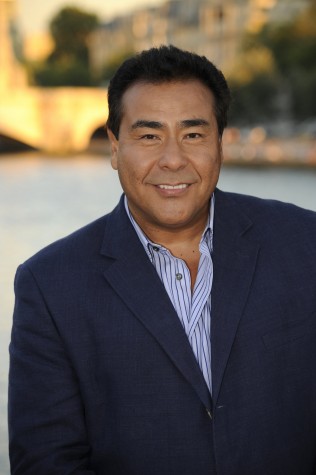ABC News host John Quiñones to share life story in SURC
April 16, 2015

The year was 1966 when a 13-year-old John Quiñones, working as a migrant farmworker alongside his family, was in the fields of Ohio picking tomatoes for 35-cents a bushel.
He faced a cold revelation staring down rows of tomato plants that appeared to have no end in sight.
It was then that Quiñones said his father, Bruno, asked him a question he would never forget.
“My father looked down and said, ‘listen son, do you want to do this for the rest of your life or do you want to get a college education?”
The answer was a no brainer for Quiñones.
Even with the odds stacked against him, the now 25 year ABC News veteran went on to receive a master’s from the Columbia School of Journalism and created a platform that would inspire the change his father encouraged.
“Here was a kid with a dream, who used to watch network news and dream of someday telling stories about his community in a different way that would present a more positive side about the heroes in his community,” Quiñones said.
Displeased with the media’s representation of Latinos in America, Quiñones decided to take matters into his own hands.
“All the stories were about illegal immigration or drugs and gang warfare. I knew there were better stories in my neighborhood that could be told and no one was telling them. So I decided that I should be the one to tell them, ” Quiñones said.
Throughout a professional career spanning more than 40 years, Quiñones has covered various historic events and has told the stories of those who live in the shadows of society.
He’s received prestigious awards including the First Prize In International Reporting and Robert F. Kennedy Prize for his exposé on “Modern Slavery – Children Sugar Cane Cutters in the Dominican Republic,” as well as seven national Emmy Awards.
“Anytime we shine the light on injustice, we have succeeded in the principles of journalism and bringing those principles to life,” Quiñones said.
Quiñones is currently the anchor of “Primetime: What Would You Do?” a hidden camera show on ABC that reveals how everyday Americans react to discrimination and injustice.
“We see on camera that people still are very ignorant about other cultures and other races, so there’s still work to be done. It certainly is worse in areas where they is very little diversity,” Quiñones said.
The show aims to bring focus back to ethical issues in society while testing to see if bystanders will speak up for victims of injustice.
“We see people react in a real positive way. I’m sitting in the back room watching it unfold on hidden camera, and it warms your heart and reminds you that there is a lot of good out there,” Quiñones said.
Using his own story as an example of perseverance, Quiñones hopes his work will continue to educate people and inspire those just like him that they, too, can make a difference.
“Now we have producers and directors who are Hispanic, who are telling our stories in a more sensitive and a more realistic way, and not kowtowing to the negative stereotypes that we saw years ago,” Quiñones said.
The power of Quiñones’ childhood dream speaks volumes as a young Mexican-American man, who didn’t even speak the language of this country, had the audacity to explore stories no one was telling. In the process, he’s been able to expose injustice and human rights violations, giving a voice to those who need it the most.
“I consider myself very lucky,” Quiñones said.
Quiñones will be on campus April 20 in the SURC ballroom at 6:30 p.m.



Shokat Merchant • Jan 23, 2017 at 6:02 pm
Dear John,
I have watched couple of your Shows. I find them very interesting as well as very practical.
But I am very much concern about the Traffic Lights on crossing causing thousand of accidents killing hundreds of people evry day all over America.
I was wondering if you could spare me some time to talk about this issue., I would be very much oblige.
Thank you,
Regards,
Shokat Merchant
818-631-4447
Haycint Buitrago • Oct 18, 2016 at 2:40 pm
Thank You Quinones for the commitment you took upon yourself to let the world know about the positive stories in our latino community!!!Wish some day you get to read this comment and would come to visit us at Green Bay, WI!!!…don’t forget this is una invitacion….
Judy okelberry • Feb 9, 2016 at 9:34 pm
I love this man and I love what would you do ? I cry over how many good people there are. In the world! It’s my favorite show on tv and I would love to meet John someday. Only if I’m doing the right thing though!! Keep up the good work John!! You’re awesome!!!